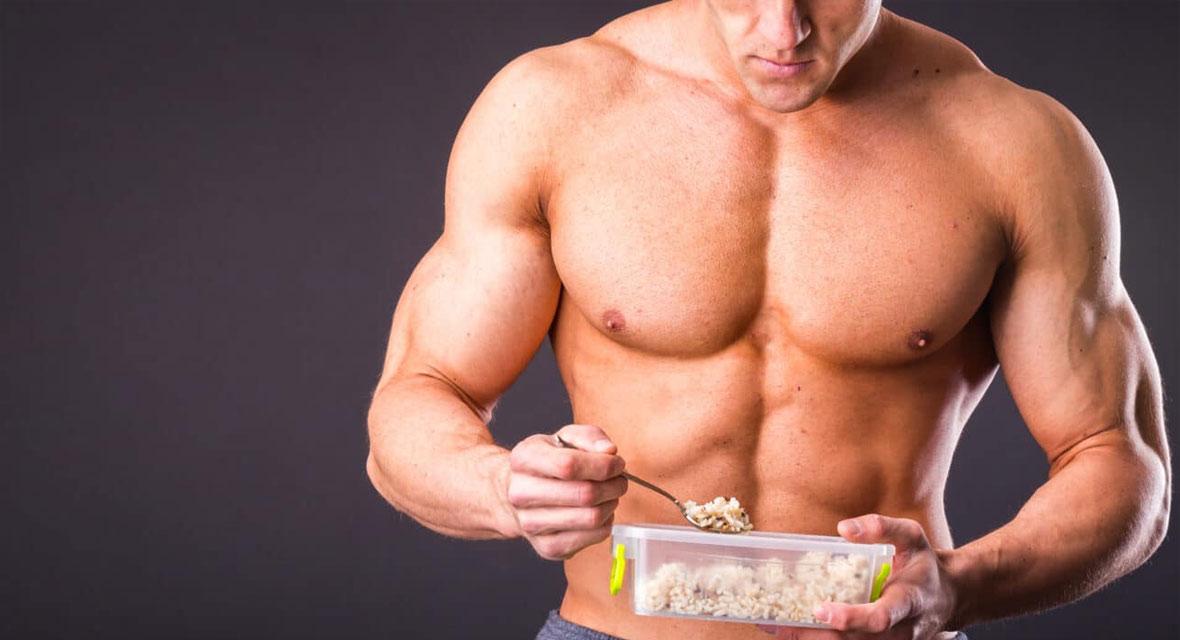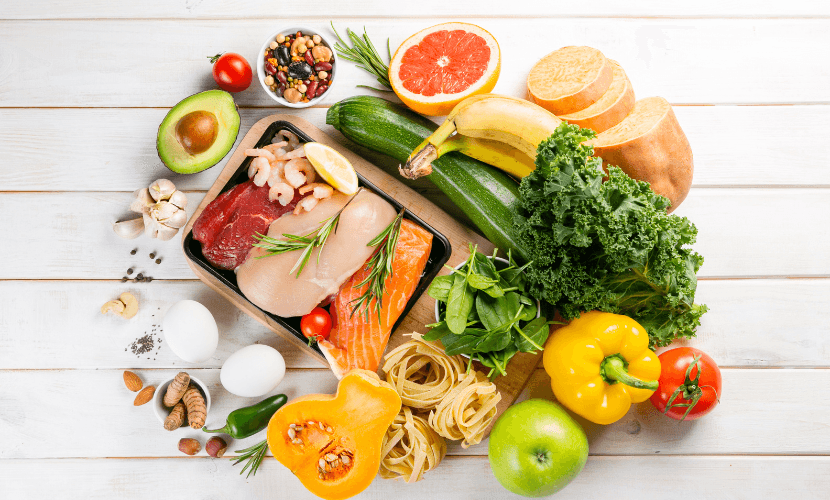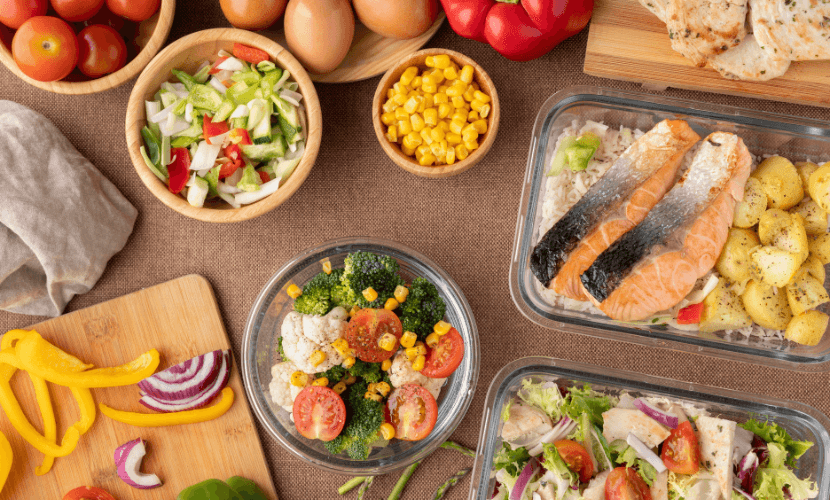🏆 As seen and loved on Shark Tank Dubai 🏆

Bodybuilding Meal Plan: What and When to Eat for Strengths?
Bodybuilders are among the most dedicated individuals on the planet. Their focus and determination are clearly reflected on the surface. And whatever work you think they put in the gym, multiply that ten times because their efforts are not limited to the four walls of the gym only. Bodybuilding requires major lifestyle changes, primary among them is their diet.
What you eat and when you eat matter in developing muscles and toning your body. You don't get to define your abs and bump your biceps and triceps just by lifting weights. You don't get that glute of your dreams by relying on gym equipment only. You don't get those fine calves by running on the treadmill for hours alone.
You have to make conscious decisions on your diet by following a muscle gain meal plan. But before you get intimidated, let us tell you that as long as you maintain a routine, following a diet will not seem like a task. It can even be an enjoyable experience. But before we tell you what and when to eat, let us get you acquainted with the nutritional needs of your body. Let us get the foundations of your body right first.
Calorie and Macronutrient Intake Needed for Bodybuilding
Broadly speaking, there are essentially two main phases that a bodybuilder prepares their bodies for – the bulking phase and the cutting phase. Every other need follows under the umbrella that these two phases encompass. While the bulking phase involves the process of gaining muscle mass, the cutting phase is all about reducing body fat. So, your calorie intake is obviously higher in the bulking phase.
Calorie Count
Being aware of how your body functions under different circumstances is crucial. You need to regularly update yourself with your weight. A good habit for keeping track of your calorie intake is to check your weight 2-3 times a week.
If your weight stays constant, then the number of calories you are consuming is your maintenance calorie. This is the stage where you are neither gaining weight nor losing it, instead, you are maintaining your weight.
When you want to get into the bulking phase, it is recommended that you increase the intake of your calories by roughly 15%. For instance, if your maintenance calorie intake is 4,000 per day, then during the bulking stage, you must eat 4,600 calories.
Similarly, if you are entering the cutting phase, then you should decrease your calorie intake by roughly 15% of your maintenance calories. In this case, your calorie intake will go down from 4,600 to 3,400. Lowering calorie count doesn't mean starving yourself. There are various smart ways to lose calories such as ditching sugar and consuming root vegetables.
One more aspect that you need to keep in mind here is that you should make sure you are not losing more than 1% of your body weight per week. This will ensure that you are not gaining too much body fat during the bulking phase or losing too much muscle during the cutting phase.
Macronutrient Amount
The three main macronutrients you need to pay attention to are protein, carbohydrate, and healthy fat. The major difference between calorie and macronutrient intake is that the latter does not change like the former during either of the two phases we mentioned earlier.
Fats contain nine calories whereas protein and carbs contain four calories per gram. It is suggested that 55% of your calorie intake should comprise of carbs, 30% of it should come from protein sources, and 15% of it should be from healthy fats.
With the basic knowledge of the nutrients under check, it is now time for you to get familiarised with a proper diet that will boost your bodybuilding journey, starting with the foods you need to include in your diet.
Food to Include in Your Diet

Including the appropriate food items in your diet will ensure that your muscles are boosted with the nutrients they need to grow bigger and get stronger from the workouts you are putting in the gym. You should bear in mind that the food items inherently will not differ in the bulking and cutting phases. It is their amount that will increase and decrease based on the phase you are in.
Meats, Fish, and Poultry
Chicken breast, sirloin steak, cod, venison, pork tenderloin, tilapia, salmon, ground beef, eggs
Grains
Rice, bread, cereals, quinoa, popcorn, oatmeal, crackers
Fruits and Vegetables
Grapes, watermelon, oranges, berries, apples, pears, bananas, peaches, potatoes, green lima beans corn, cassava, green peas.
Nuts and Seeds
Walnuts, almonds, cashews, flaxseeds, chia seeds
Legumes and Beans
Chickpeas, kidney beans, pinto beans, black beans
Dairy
Unsweetened yoghurt, low-fat milk, cottage cheese
Oils
Avocado oil, flaxseed oil, olive oil
Food to Avoid from Your Diet
Practising abstinence from food items that are not only not going to provide any benefit to your body but harm it instead is paramount. Now, we are not asking you to discard them completely from your life. Once in a blue moon is okay for you to indulge and let yourself loose. For instance, once a month, you can go party and have a cheat day but make sure to limit yourself.
Any food item that is going to slow down your digestion or will make your stomach upset is not your friend. With that being said, the food items you need to avoid for bodybuilding are as follows.
Artificial Sugar
Cookies, doughnuts, cakes, candies, ice-creams, sweetened beverages
High-fat Food
High-fat meats, creams, butters, heavy sauces
High-fibre Food
Cruciferous vegetables such as cauliflower, broccoli
Deep-fried Food
Fried chicken strips, French fries, fish, fried fish, onion rings, cheese curds
Alcohol
This is pretty self-explanatory since alcohol affects your chances of losing fat and building muscles.
Carbonated Beverages
Soda, soft drinks, aerated drinks, sparkling water
An All-Inclusive Bodybuilding Meal Plan

Contrary to popular belief, bodybuilding meal plans don't have to be boring, bland, repetitive, or restrictive. There is a wide range that you can choose from since the choices are limitless. Conservative bodybuilding meals often led to inadequate intake of essential vitamins and minerals because of how restrictive they were.
A common nutritional fact that people ignore is that they think they need to consume small meals every 2-3 hours. This is not mandatory. You can follow the common three main meals of the day along with snacks and will still do perfectly fine.
Therefore, variety is the key to formulating the healthy meal plans. We are providing you with a range of meal plan delivery options for all your essential meals of the day. Feel free to swap around different options on different days of the week so that you never get bored of consuming the same type of food.
Breakfast
Oatmeal with a peer, scrambled eggs, chicken sausages with eggs, whole-grain tortilla, protein pancakes, Greek yoghurt with berries, Sunny-side egg with fresh fruits, veggie omelette
Snack
Oatmeal nut butter snack, yoghurt parfait, cottage cheese and muffin, chocolate protein pudding, protein balls with orange and almonds, mixed nuts, tuna with apples and crackers, yoghurt with berries, hard-boiled eggs with fresh fruits.
Lunch
Sirloin steak with spinach salad and sweet potato, chicken breast with broccoli and baked potato, tilapia fillet with steamed veggies, basmati rice with turkey breast and mushroom, pork tenderloin slices with carrots, green beans, and roasted garlic veggies, pinto beans with sautéed veggies.
Dinner
Stir-fry shrimp with bell peppers, diced beef with black beans and rice, turkey meatballs with sautéed kale, ground beef with brown rice, mackerel with asparagus, green salad, vinaigrette, and brown rice, salmon and quinoa.
Conclusion
Bodybuilding can't be achieved with rigorous exercises alone. You need to compliment it with the right type of food at the right time. Being aware of what you include in your diet will give you better odds of growing your muscles and boosting your strength.
Furthermore, a muscle-building diet doesn't have to be stale or boring. With the variety of options provided above, sky is the limit. Keep on shuffling the meals every day of the week and keep your muscle-boosting journey fun.
Reach out to start your fitness journey with us!
Meal Plans
Delivery Details
Legal Information
© 2020-2026 VMeals. All rights reserved. VMeals™ is a trademark of Flip Side Restaurant and Cafe L.L.C
We accept
